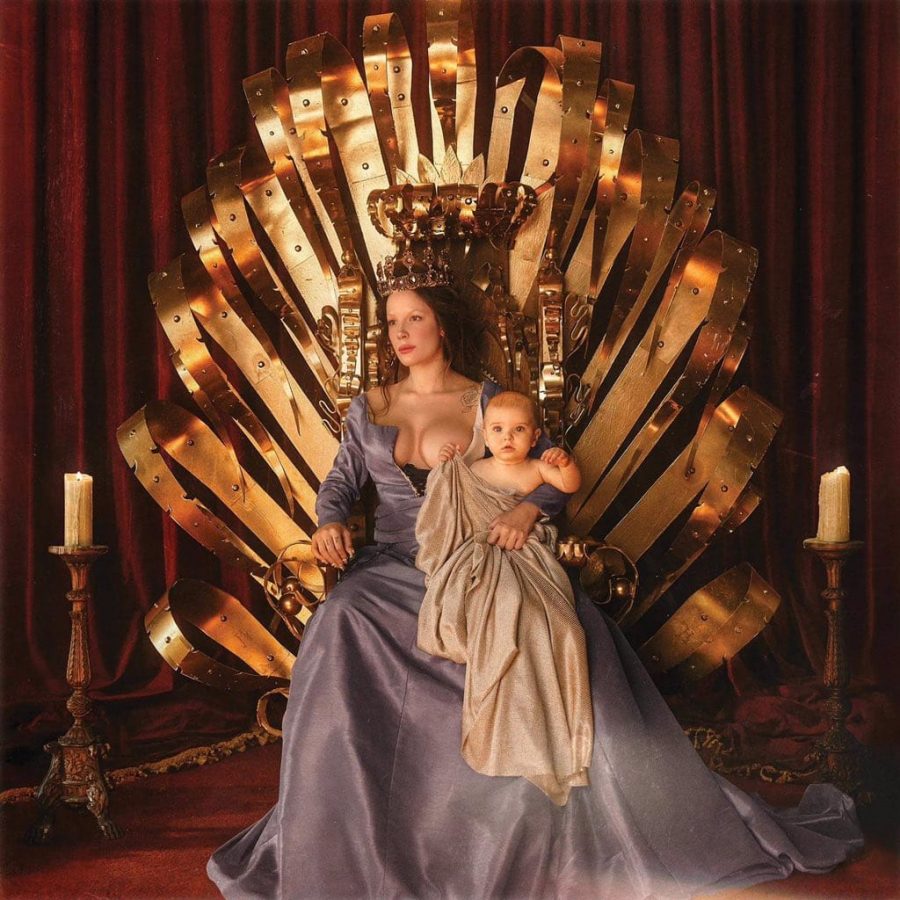Halsey’s fourth studio album, “If I Can’t Have Love, I Want Power,” came into the world with little warning. The lack of singles prior to the album’s release ensured a listening experience that was both shocking and satisfying in its completeness. Produced by Trent Reznor and Atticus Ross of Nine Inch Nails, the album’s sound is characterized by dark, industrial undercurrents of distortion and heavy bass lines. While these sonic elements don’t immediately call to mind the themes of pregnancy, motherhood and the Madonna-whore complex that are littered throughout the album, the two meld into a strangely perfect combination.
Its release was preceded by the birth of Halsey’s first child, and they’ve talked extensively about how their pregnancy impacted the record. They describe the album as an exploration of “control and body horror,” a scathing refusal to experience womanhood as the delicate, inoffensive state that it is often portrayed as.
The album starts off with two slow, lilting tracks: “The Tradition” and “Bells in Santa Fe.” The latter features Halsey softly crooning “all of this is temporary” over a foreboding instrumental. “The Tradition” tells the story of a girl being sold to the highest bidder, only to be returned because “all she does is cry.” This could easily be taken as a metaphor for fame, or more broadly for womanhood in general. Hints of religion and self-loathing, an ongoing pattern throughout the album, begin to crop up in “Bells in Santa Fe.” The conjoining of both themes is somewhat of a motif in both Halsey’s and Nine Inch Nails’s discography; thus, it provides a compelling lens through which to view the unexpected collaboration.
“Easier Than Lying,” the album’s third track, truly lets the listener know what they are in for. The unbridled rage present in the shouted line, “You liar, you don’t love me too,” is as cathartic as it is brutal. Along with “Easier Than Lying,” “Lilith” and “Girl is a Gun,” which seem to be intended as a trio examining the strength found through leaving an unhealthy relationship, “Girl is a Gun,” is a song that’s sound can only be described as akin to a high-speed car chase, delves further into Halsey’s pop roots than any other track with its catchy hook and kitschy lyrics. Even so, it never comes off as out of place, but rather stands as a testament to Halsey’s ability to evolve without sacrificing what launched their career in the first place.
The following trio of songs: “You Asked for this,” “Darling” and “1121” form the most emotionally vulnerable chapter of the album. “1121,” which Halsey confirmed is a reference to the date they found out they were pregnant, feels especially raw as it finds the singer begging “please don’t leave.” In “You asked for this,” lines like “you know I’m still somebody’s daughter,” portray the fear inherent in becoming a parent with aching simplicity. Fear is a constant on this record, neatly embodied by the suffocating domesticity of “lemonade in crystal glasses.” Contrastingly, “Darling” is a stripped-down lullaby backed by Lindsey Buckingham on guitar. It comes to a quiet conclusion with one of the album’s most heartbreaking lyrics from Halsey to their newborn son, “foolish men have tried / But only you have shown me how to love being alive.”
The most violent, rambunctious tracks of the album make up its latter half. “honey” relies heavily on an infectious melody, and while the lyrical content isn’t at the center, it packs the harsh but seductive punch that fans of Halsey have come to expect. The lead single, “I am not a woman, I’m a god,” is reminiscent of early Nine Inch Nails with its chaotic industrial sound and simultaneously self-obsessed and self-hating lyrics. “The Lighthouse” is the most unique track of the album, as it tells the story of a siren luring sailors to their death. However, the overarching theme of finding strength in femininity is present as Halsey proclaims, “I’m glad I met the devil cause he showed me I was weak / and a little piece of him is in a little piece of me.”
The closing track, “Ya’aburnee,” takes a sharp turn in a more mellow direction. Like “Darling,” it could be thought of as a lullaby, though its sentiment is much darker. Halsey promises, “You will bury me / Before I bury you,” a shockingly honest statement that exposes a morbid facet of the love that a parent has for their child. As the closer to a pleasantly messy, unapologetic album, it’s unexpected but not unwelcome. It serves as a gentle reminder that among the more violent, unpredictable phases of life, there is always some softness to be found.
As of right now, “If I Can’t Have Love, I Want Power” stands alone among recent releases. It’s decidedly not a pop album, yet it remains accessible. While the lyrical content is some of Halsey’s best, packed with clever turns of phrase and subtle connections to their past work, more experimental production could’ve elevated the project even further. Although there are some riskier moments, the spoken phrases in “Whispers” for example, the album feels almost too cohesive given its emotional edge. That being said, it stands as one of the most fascinating records of this year and bodes incredibly well for the future of Halsey’s sound.
Molly Hamilton can be reached at [email protected].




















